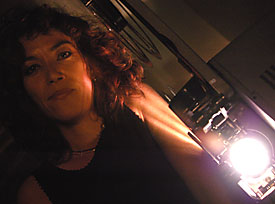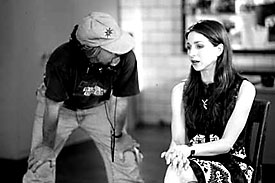 |
|
DEREKH FROUDE/Arizona Daily Wildcat
|
The 12th annual Arizona International Film Festival begins this week, and will feature over 140 short films and documentaries. Along with film screenings, the festival will also feature workshops, panels and parties.
|
|
By Lindsay Utz
Arizona Daily Wildcat
Thursday April 3, 2003
The Arizona International Film Festival's philosophy lies in its commitment to promote independent filmmaking
For many people, cinema is a form of escapism ÷ a reclining chair in a dark air-conditioned room, which, with the Tucson heat kicking in, doesn't sound like a bad idea. Yet for many serious fans of cinema, the idea of escaping life is a wimpy excuse for going to the movies. Their ideology is quite the opposite. They believe that going to the movies is a quest for enlightenment, not diversion.
In the coming 10 days, the 12th annual Arizona International Film Festival will transform the great American pastime into a religious movement for the cinema-obsessed.
With screenings, workshops, panels and parties happening at nine separate locations throughout the city, the festival promises some amazing events. And like any good festival has the power to do, the city will begin to feel smaller, with a sense of community in the air.
Filmmakers' reactions after the events of Sept. 11 made last year's festival more political than it had been in years past. "Bridging Cultures" became the term associated with the festival, cementing its reputation as the melting pot festival; films came in from all around the world.
"We suddenly realized that the festival could make people understand different cultures," said Guilio Scalinger, founder of the festival.
With more than 140 short films, documentaries and features, and programs such as Indigenous Cinema and Cine Chicano ÷ in addition to the 82 American and international films in competition ÷ this fest is not lacking in diversity. In fact, it's likely a lot of what's in the festival this year will be a reaction to what's happening in the world today.
"You can judge the pulse of the nation by what you see in independent films; you can't judge it by Hollywood," Scalinger said.
"We noticed there were less comedies this year. There were much darker films."
 |
|
PHOTO COURTESY OF THE AZ FILM FESTIVAL
|
Jay Craven directs "The Year That Trembled," a film about students dealing with the aftermath of the Kent State shootings in 1970. The film is Craven's third to be screened at the Arizona Film Festival.
|
|
"In such a busy, saturated media culture that we have, it's important that people find cultural artifacts that support them and who they are and what they feel," said Jay Craven, director of a film showing in this year's fest.
Craven's film, "The Year That Trembled," is his fourth feature film and third one to play at the Arizona film fest. Set on a college campus in 1970, just after the Kent State shootings, this film traces the lives of young adults coming of age in a time of war. The themes resonate in a timeless way but, because of our current war, are especially relevant.
"Many people experienced this time in the sixties, and there are young people who didn't experience it that are very curious about it because of their own activist interests now," Craven said. "It fortifies people so they don't feel so isolated and so alone."
With the documentary program bigger and stronger than in previous years, there will be a variety of activist films at the fest. Also, the Academy Award-nominated documentary "Spellbound" will be showing. Whatever the interest or issue, there's a film for everyone.
"It's my form of political activism. Everybody has a cause; my cause is independent filmmaking," Scalinger said.
WHERE TO GO
The Arizona International Film Festival starts tonight and runs through April 13. For venue locations, film information and times check out their Web site at www.azfilmfest.com
"Llama Walks" ÷ Yuri Makino
· April 9, 9:30 p.m. at The Screening Room, 127 East Congress St.
· April 12, 1:00 p.m. at The Screening Room, 127 East Congress St.
"The Year that Trembled" ÷ Jay Craven
· April 13, 7:30 p.m. at The Screening Room, 127 East Congress St.
|
Funding for independent filmmaking in America has dropped since the early 90s. The French government last year put $400 million into supporting its own indigenous film industry. In the United States, the National Endowment for the Arts gave a mere $2 million.
"It's kind of discouraging. Not that it was ever easy to make a film, but there's definitely less financing for independent films than before," said Yuri Makino, professor of media arts at the University of Arizona and director of a documentary showing in the festival.
Money for education, production, distribution and exhibition of independent film is severely lacking in this country, making the independent filmmaker's quest an extremely difficult one.
"If I look at the situation in Europe, Canada and Australia, there is a distinct appreciation for and support for what I would call cultural filmmaking," Craven said. "Filmmakers have to fight harder, be sharper and ultimately just be tougher in America."
There aren't nearly enough venues for independent filmmakers to, but festivals like the Arizona International Film Fest are crucial to the survival of independent film in this country.
"What Guilio is doing is exactly what needs to be done in order to build independent film culture and to provide an alternative to simply the commercial mainstream," Craven said.
Two independent filmmakers showing their work in the festival this year, Vermont-based Craven and local filmmaker Makino, are examples of the hardworking, independent artists.
"The challenge for an American Independent filmmaker is to be able to see oneself as independent for the long haul and not just in terms of making a film which is a stepping stone into the mainstream of the industry," Craven said.
During college, he traveled to Vietnam as a peace ambassador and worked with John Lennon a few years later. Although he has had both the success and opportunity to use his independent work as a stepping stone into "bigger" things, Craven has remained loyal to his native Vermont ÷ living, teaching and helping to build film culture in his state
The idea for "The Year that Trembled" came about in the summer of 1997 when he met a man who was working on a novel about three kids getting out of high school who feared getting drafted for the Vietnam war.
"As an independent filmmaker, increasingly you look for allies that could help movies get made," Craven said.
After deciding to collaborate together, Craven began working on the script, surrounding himself in research, novels and movies from that era.
"I tend to start in very broad strokes and to get to know the characters well enough so that they can start to lead me. When I sit and write my foot taps, I get a sense of a rhythm I'm trying to create," Craven said. "I'm struck by small bits of inspiration all the time."
Since completion, the film has been shown in many festivals across the country and is showing in May at the Cannes Film Festival in France.
"In my own work, I'm looking to try and find new ways to tell stories that really approach cinematic language for what it is that is unique about it and makes it different from literary language," Craven said.
Makino's film, "Llama Walks", is a personal documentary and totally different undertaking from the bigger budget/ larger crew production such as Craven's. An incredibly intimate piece about Makino's family, "Llama Walks" explores the different cycles of life: death, aging and birth.
"Throughout filming, I spotted these different themes, and then when I went through the editing process I was able to follow (them)" Makino said.
Shooting on digital video kept both the production and post-production costs low. By carrying a small, indiscreet digital camera around, the audience is invited inside personal situations otherwise impossible to shoot.
"Stylistically, the way the film is shot it really asks the audience to be really patient. It's very much about letting it unfold and letting it have a sort of certain distance from the characters," Makino said.
After film school, Makino continued to make films but decided that teaching was something she loved and was dedicated to.
"Growing up, teachers were the most influential people in my life, and so I realized how important it was (to encourage) people when they're young or new at whatever interest or field they're going into," she said. "I think it's a lot about giving other people the kind of confidence, support and skills they need and it's a very rewarding profession."
This is Makino's first documentary and second film in the Arizona International Film Festival.
"I think they get a lot of good work here. The atmosphere is really unpretentious," she said. "There are a lot of possibilities for interactions. You could go to other festivals and not necessarily meet filmmakers and everyone would be sort of anonymous. I think that's why people would call (the festival) filmmaker friendly."
"Filmmakers are thoughtful people, they are weird people, there are unusual perspectives and there is an evolving aesthetic in film that is exciting," Craven said.
When asked Scalinger what stars will be at the festival, he replied, "The stars that are coming are the independent filmmakers and their films, and that's our approach. That's what we care about."

